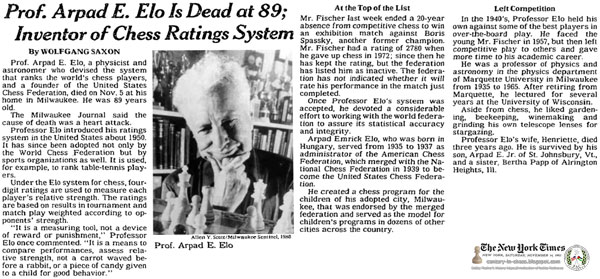New York Times, New York, New York, Saturday, November 14, 1992 - Page 27
Prof. Arpad E. Elo Is Dead at 89; Inventor of Chess Ratings System
Prof. Arpad E. Elo, a physicist and astronomer who devised the system that ranks the world's chess players, and a founder of the United States Chess Federation, died on Nov. 5 at his home in Milwaukee. He was 89 years old.
The Milwaukee Journal said the cause of death was a heart attack.
Professor Elo introduced his ratings system in the United States about 1950. It has since been adopted not only by the World Chess Federation but by sports organizations as well. It is used, for example, to rank table-tennis players.
Under the Elo system for chess, four-digit ratings are used to measure each player's relative strength. The ratings are based on results in tournament and match play weighted according to opponents' strength.
“It is a measuring tool, not a device of reward or punishment,” Professor Elo once commented. “It is a means to compare performances, assess relative strength, not a carrot waved before a rabbit, or a piece of candy given to a child for good behavior.”
At the Top of the List
Mr. Fischer last week ended a 20-year absence from competitive chess to win an exhibition match against Boris Spassky, another former champion. Mr. Fischer had a rating of 2780 when he gave up chess in 1972; since then he has kept the rating, but the federation has listed him as inactive. The federation has not indicated whether it will rate his performance in the match just completed.
Once Professor Elo's system was accepted, he devoted a considerable effort to working with the world federation to assure its statistical accuracy and integrity.
Arpad Emrick Elo, who was born in Hungary, served from 1935 to 1937 as administrator of the American Chess Federation, which merged with the National Chess Federation in 1939 to become the United States Chess Federation.
He created a chess program for the children of his adopted city, Milwaukee, that was endorsed by the merged federation and served as the model for children's programs in dozens of other cities across the country.
Left Competition
In the 1940's, Professor Elo held his own against some of the best players in over-the-board play. He faced the young Mr. Fischer in 1957, but then left competitive play to others and gave more time to his academic career.
He was a professor of physics and astronomy in the physics department of Marquette University in Milwaukee from 1935 to 1965. After retiring from Marquette, he lectured for several years at the University of Wisconsin.
Aside from chess, he liked gardening, beekeeping, winemaking and grinding his own telescope lenses for stargazing.
Professor Elo's wife, Henriette, died three years ago. He is survived by his son, Arpad E. Jr. of St. Johnsbury, Vt., and a sister, Bertha Papp of Alrington Heights, Ill.























